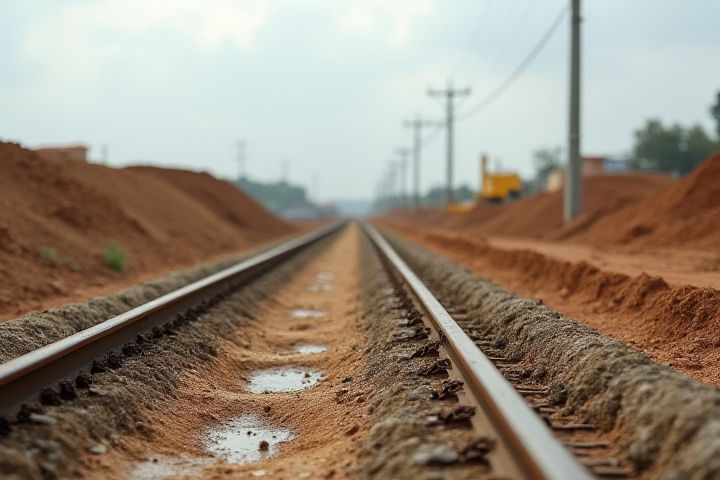
Nigeria's infrastructure projects focus on enhancing transportation, energy, and urban development. The government is investing heavily in road construction, aiming to improve connectivity between major cities and rural areas. Additionally, the railway modernization initiative seeks to rejuvenate outdated rail systems, promoting efficient freight and passenger movement. In the energy sector, the expansion of renewable energy sources, particularly solar and wind, is crucial to addressing the country's chronic power shortages. Your involvement in these projects can contribute significantly to the nation's economic growth and sustainable development.
Lagos-Ibadan Expressway expansion
The Lagos-Ibadan Expressway expansion is a pivotal infrastructure project aimed at improving transportation efficiency between Nigeria's commercial hub, Lagos, and the northern regions. This vital expressway supports over 2 million vehicles daily, reducing travel time and enhancing trade connectivity. In collaboration with international investors, the Nigerian government is investing significantly to upgrade road safety features and ease vehicular congestion. As the project progresses, it promises to stimulate economic growth by facilitating smoother logistics and commuting for residents and businesses alike.
Mambilla Hydroelectric Power Station
The Mambilla Hydroelectric Power Station, located in Taraba State, Nigeria, is poised to become the country's largest hydroelectric facility upon completion, generating approximately 3,050 megawatts of electricity. Through improved power generation, this project aims to significantly reduce electricity shortages and boost economic growth, benefitting both urban and rural communities. With a projected investment exceeding $5.8 billion, it emphasizes not only energy production but also job creation and local infrastructure development. Supporting sustainable practices, the Mambilla project reflects Nigeria's commitment to renewable energy and energy security for future generations.
Second Niger Bridge construction
The Second Niger Bridge, a critical infrastructure project in Nigeria, is designed to enhance connectivity between the eastern and western regions of the country. This bridge aims to alleviate traffic congestion on the existing Niger Bridge and facilitate the movement of goods and commuters. As a vital link in Nigeria's transportation network, it supports economic growth by improving trade efficiency and access to markets. With its completion, you can expect a significant boost in regional development and an increase in tourism opportunities.
Abuja-Kaduna-Kano Road modernization
The modernization of the Abuja-Kaduna-Kano Road is a key infrastructure project in Nigeria aimed at enhancing connectivity and improving transportation efficiency. This project will facilitate economic development by reducing travel time and increasing accessibility to major markets and urban centers. Investments in road safety measures and maintenance will significantly decrease traffic accidents and promote safer travel experiences for commuters. With a focus on sustainability, the modernization efforts will also incorporate eco-friendly practices to mitigate environmental impacts during construction and operation.
Dangote Refinery establishment
The Dangote Refinery, located in Lekki, Nigeria, represents a significant infrastructure development aimed at reducing the country's reliance on imported petroleum products. Spanning approximately 650 acres, it is poised to become the largest single-train petroleum refinery in the world, with a processing capacity of 650,000 barrels per day. This strategic initiative not only aims to enhance local production but also aligns with Nigeria's economic diversification goals by creating thousands of jobs and stimulating ancillary industries. By investing in this megaproject, Nigeria seeks to improve its energy security and bolster its position as a leading oil producer on the African continent.
Lagos Metro Rail project
The Lagos Metro Rail project is a transformative infrastructure initiative aimed at enhancing public transportation in Nigeria's bustling economic hub. This ambitious project will connect key areas of Lagos, significantly reducing travel time and alleviating traffic congestion. With advanced technology and sustainable design, the metro system is set to improve mobility, increase economic productivity, and support urban development. As a vital component of Nigeria's infrastructure strategy, the Lagos Metro Rail project reflects the country's commitment to modernizing its transportation network.
Ajaokuta-Kaduna-Kano Gas Pipeline
The Ajaokuta-Kaduna-Kano Gas Pipeline project is a crucial infrastructure initiative designed to enhance Nigeria's gas supply and distribution capabilities. Spanning over 614 kilometers, this pipeline aims to facilitate the transportation of natural gas from the Niger Delta region to northern Nigeria, significantly boosting access to energy. By supporting industrial growth and improving local economies, the project plays a pivotal role in Nigeria's vision for energy security and economic diversification. Connecting various states, the pipeline will further support the development of gas-based industries and create job opportunities in the region.
Nigeria Electrification Project
The Nigeria Electrification Project aims to improve access to electricity in rural and underserved areas across the country. By implementing solar power systems and expanding grid connections, the initiative addresses the critical energy deficit faced by millions of Nigerians. This project not only enhances energy availability but also promotes economic development and job creation in various sectors. Engaging local communities ensures that your participation fosters sustainable growth and improves living standards.
Nigeria-Cameroon Highway link
The Nigeria-Cameroon Highway link is a crucial infrastructure project aimed at enhancing trade and economic cooperation between Nigeria and Cameroon. This vital roadway will facilitate the movement of goods and services, significantly boosting regional commerce and connectivity. Key improvements include upgraded road conditions, enhanced safety features, and strategic border control measures to streamline customs processes. The completion of this highway link is expected to foster growth in local economies and promote cross-border travel for citizens.
Lekki Deep Sea Port development
Lekki Deep Sea Port, strategically located near Lagos, is a pivotal infrastructure project aimed at enhancing Nigeria's maritime capacity. This modern port facility will facilitate larger vessel docking, significantly increasing trade efficiency and stimulating local economies. The Port is designed to include advanced cargo handling and storage systems, bolstering Nigeria's position as a key player in West African shipping routes. Investing in this development promises job creation, improved logistics networks, and a boost in foreign direct investment for the region.
